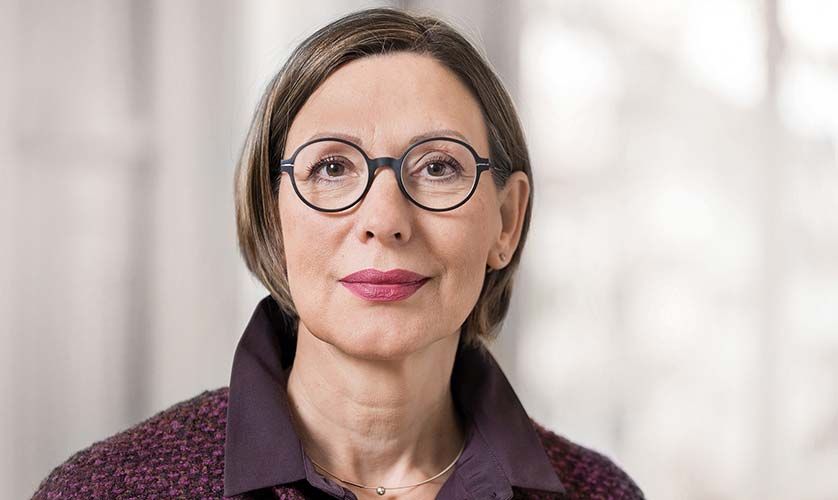Navigation auf uzh.ch
Navigation auf uzh.ch

Gabriele Siegert has very little idle time these days. The role of Deputy President she has taken on involves more than simply standing in for the President – she now also oversees the Office for Gender Equality, the Evaluation Office and the sustainability team. Why these particular areas? “Each of these units represents values and principles that should guide the actions of UZH – sustainability, equality and good management,” says Siegert. And since the offices for Student Services and Student Affairs and Advisory Services have been added to the area she’s overseeing as Vice President, the role she continues to hold now also includes new duties and appointments. As a result of all these added responsibilities, she has had to further curb her involvement at the chair for communication studies.
What drives Gabriele Siegert? Sitting in her office at Hirschengraben, she explains: “Even the decision to become Vice President was a significant one for me.” It involved a major change in her professional life: In her previous work as an academic, she had mainly relied on her analytical and reflective skills, whereas as a member of the Executive Board of the University, she above all has to use her creative abilities. “As Deputy President and Vice President, my freedom to shape things, but also the responsibilities this brings are greater than before.”
The Augsburg native appears focused and well organized. She explains that she can only manage her workload thanks to the very experienced employees who support her.
There are several areas that currently require her attention. For one, she plans to realign UZH’s evaluation procedures and combine them with the quality management processes for teaching and learning as well as the strategic and development discussions to build a comprehensive quality process. “Quality management processes point the way for a university,” says Siegert. In concrete terms, the evaluation processes at UZH are to become shorter and more efficient. This will reduce the time it takes for an evaluation to reach its conclusion and produce actual measures.
When it comes to gender equality, Siegert’s first priority is the professorial appointment procedures. “We must do everything we can to recognize and avoid unconscious bias against female researchers,” says Siegert. This is why she has also assumed responsibility for the OTM-R project. OTM-R stands for Open, Transparent and Merit-based Recruitment of Researchers and provides a series of practical and useful tools that help to improve transparency with regard to a university’s recruitments and appointments. The Professorships Department, for one, has already implemented a number of key measures.
Besides this, Gabriele Siegert believes it is also important to consolidate UZH’s new Diversity Policy, which states that non-discriminatory participation of all UZH members must be ensured. She is convinced that working groups and teams are more creative and do better work when they’re made up of diverse employees who can draw on a variety of experience.
The third area Gabriele Siegert wants to promote is sustainability. Professor Lorenz Hilty and his team are currently drawing up a sustainability policy, along with strategies on how to implement it. Here, too, initial efforts are focused on raising awareness of the topic. Only then can concrete measures follow. One of the things Siegert has in mind is social nudging, which can be used to promote decisions that people wouldn’t make otherwise, such as choosing a vegetarian dish by placing the vegetarian option at the very top of the cafeteria menu. Incentives could also be useful here. “There’s no shortage of ideas, but we need courage and quite often also a budget to be able to turn them into reality,” says Siegert.
And what does she do to unwind after a busy week? She tries not to work on one day at the weekend and then either plays golf or spends time at home, tidying up or working in the garden. “It’s very gratifying to see the fruit of your labor right away,” she says, and sets off to attend her next meeting.